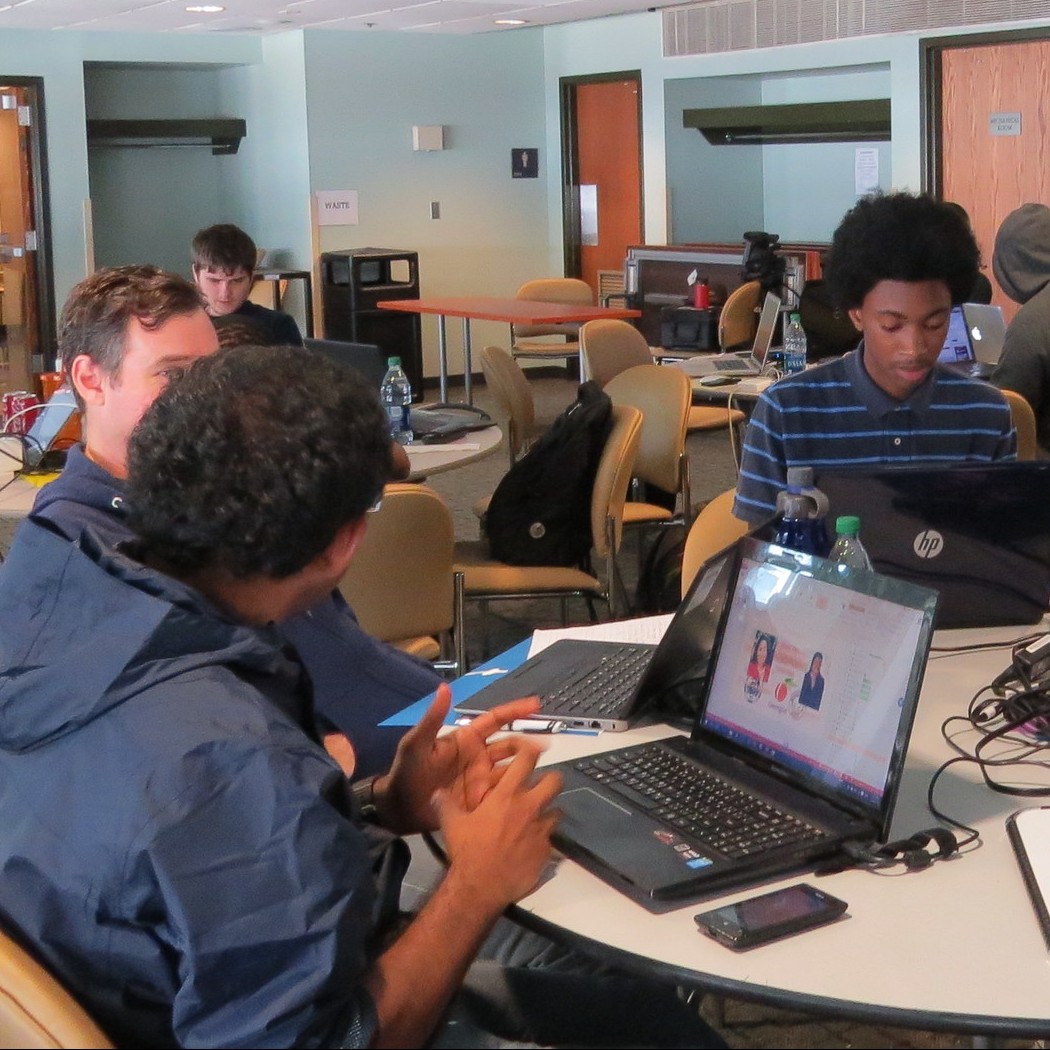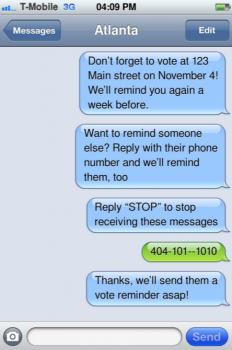| Client: | New Georgia Project |
| Dates: | October 2015 – May 2016 |
| Skills/Subjects: | civic media, interaction design |
| URL: | http://andyhub.com/wordpress/wp-content/uploads/Unlock-The-Box.pdf |
Background
One night at Georgia Tech, I and my colleagues Sasha Azad and Shanu Salunke worked with the New Georgia Project‘s (NGP) Director Nsé Ufot to see how we could collaborate to improve voting access in the state. We were particularly interested in targeting the Rising American Electorate — people of color, those 18 to 29 years of age, and unmarried women—who comprise 62% of the voting age population in Georgia yet only 53% of registered voters. We identified three areas we could best contribute: election monitoring, a registered voter API, and a social reminder system.
Election monitoring system
Queues at polling places can be so long that it turns away potential voters. NGP’s election monitors try to handle this and help do manual load balancing by communicating with each station via Google Hangouts. A similar situation occurs in many other countries. I previously worked with a research group on the election monitoring tools Aggie, ELMO, and CROMO. In NGP’s case, we have proposed using Aggie to help them monitor polling stations from their headquarters and CROMO and ELMO to better coordinate their election monitors.
Registered voter API
Millennial voters are not engaged enough in voting and elections, and NGP is trying to get these people to the ballot box. I first met Nsé at a Code for Atlanta meetup and again at their hackathon. One way of engaging this generation of voters is by helping people access data and develop services and applications. We proposed building a registered voter API on top of the file made available by Georgia’s Secretary of State, as it’s currently only available on a CD mailed to the requester. An API would allow hackathons, coding groups like Code for America, and other developers who want to contribute to civic tech.
Polling place data is also difficult to develop with. The Georgia Secretary of State (SoS) only makes this data available through a web form rather than a more developer-friendly database. My colleagues Amanda Meng and Michael Jablonski found that this is because Georgia has a decentralized voting system. The selection of precincts and the designation is, by statute, left to each county, so the SoS Elections Division does not seem to have a unique identifier for each precinct or polling place. Each county tells the SoS the precinct name and ID, but the SoS does not need to identify each precinct for tabulation purposes because that data is identified by the serial number of each voting machine. The SoS also doesn’t know which machines are assigned to which precincts. The vote data is then downloaded to an accumulator that is then transmitted to the SoS and followed by a copy on a hard drive (plus any paper ballots) transported to the SoS office by state trooper (again by statute).
I have posted the latest information for this on Code for Atlanta’s open data portal, maintained by Socrata, which provides an API and visualization tools.
Social reminder system
There is a low turnout and low awareness of elections among the Rising American Electorate. There is also a historical movement to bringing the same level of awareness to the youngest and low-income voters. In order to make voting information as accessible as possible, we proposed a social reminder system that automatically sends text messages to the numbers in the voter registration file. We learned, though, that these number go stale rather quickly as people change numbers and phones. So we also suggested that this system also ask voters for the friend’s numbers to both remind them to vote as well as update the voter file.
Future work
Some future work in this space are related to transparency. Of the topics we discussed in this project and further work through Code for Atlanta, these could be grouped by activities of education, administration, registration, voting, and monitoring. A more user-centered design intervention approach could target groups like citizens, the secretary of state’s office, and NGP itself. It could also involve everyone from a systemic point of view.
Topics per target group
Citizens
- People often just don’t know about My Voter Page (MVP).
- People previously incarcerated often don’t know how to become eligible to vote again.
- People who apply often don’t register to vote
- People who frequently move face significant barriers to voting due to non-current contact info.
- Wait times at polling places impose significant difficulties to voting.
SoS
- Changes to polling places are emailed late.
- Precinct cards are sometimes not being delivered to registrants.
- Registration data on MVP is slow to be updated.
NGP
- NGP proxies attending BoE meetings don’t always know what to look for.
- It takes too long to reach every voter individually.
- Private voter registration efforts are required to do more than public efforts.
System
- There have been Voting Rights Act violations.
- Voting suppression is more sophisticated.
- Misinformation is common.
Topics per activity
Education
- People often just don’t know about MVP.
- People previously incarcerated often don’t know how to become eligible to vote again.
- Misinformation is common.
Administration
- Changes to polling places are emailed late.
- Precinct cards are sometimes not being delivered to registrants.
- Registration data on MVP is slow to be updated.
Registration
- People who apply often don’t register to vote
- People who frequently move face significant barriers to voting due to non-current contact info.
- Private voter registration efforts are required to do more than public efforts.
Voting
- Wait times at polling places impose significant difficulties to voting.
- There have been Voting Rights Act violations.
- Voting suppression is more sophisticated.
Monitoring
- NGP proxies attending BoE meetings don’t always know what to look for.
- It takes too long to reach every voter individually.

